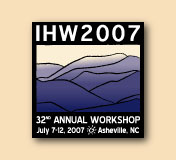 |
 |
||
|
CALL FOR ABSTRACTS GENERAL INFORMATION
The 32nd International Herpesvirus Workshop will accept abstracts for presentation from January 10, 2007 through Monday, April 9, 2007, midnight Eastern Daylight Time. Abstracts should be submitted through this website by selecting the “Submit or Edit an Abstract” link below. If online submission is not possible, please contact the Abstract coordinator, Tamara Muldoon, at Register@ConferenceSolutionsInc.com, or 503.244.4294 ext 202. Submitting authors must register to attend the Workshop by the abstract submission deadline, April 9th, in order to have their abstracts accepted. All accepted abstracts received by April 9th, 2007 will be printed in the Abstract Book, and will be presented as posters at the Workshop. Poster space is 4 ft. x 4 ft., approximately 1.2 m. x 1.2 m. A limited number of abstracts will be selected for oral presentations. More than one abstract may be submitted by a single author; the fee is US$100 per additional abstract. If you are submitting more than one abstract, you must note this on your Workshop Registration Form and pay the additional fee. You must complete one Abstract before beginning another. Formatting of Abstracts for the Abstract Book including fonts, font sizes, underlining, bolding etc. will be done electronically by the Workshop Managers. Thus you can submit abstracts in any font and font size. We recommend that you submit your abstract Title in ALL CAPS (upper case text). All Abstract Titles will be printed in Times New Roman 12 pt Bold Caps. Authors and institution will be printed in Times New Roman 10 pt Italic. The primary author’s name will be underlined in the printed Abstract book. Abstract content will be printed in Times New Roman 10 pt. In order to fit into the space allotted, the body of each Abstract is limited to 2500 characters including spaces and punctuation. This is the maximum number of characters that the online submission will accept for an abstract. To include Greek letters, superscript or subscript text in your abstract, you will need to use the buttons above the abstract field on the input form. If you need assistance with this, please feel free to contact us at 503.244.4294, etc. 202 or email to Register@ConferenceSolutionsInc.com. Compliance with all stated conditions including adherence to the deadline is required. Acknowledgement of receipt of completed abstracts will be sent via email upon submission. Submitting authors must register to attend the Workshop by the abstract submission deadline, April 9th, in order to have their abstracts accepted. The Organizing Committee reserves the right to decide whether a submission will be accepted, and the right to determine the form of presentation. The Organizing Committee plans to notify authors of acceptance and form of presentation by April 30, 2007. Please gather all necessary materials prior to submitting your abstract: For Primary Author: Name, Institution, Department, Email Address, Mailing Address, City, State/Province, Postal Code, Country, Phone Number For additional authors: Name, Institution Topic selections (first and second choices) Abstract text Select “Submit or Edit an Abstract” link below. To complete your Abstract submission, simply follow the instructions and prompts on each page. Log in with your email address and create a password (Record and file your password for future use.) Read and accept the Deadlines and Procedures Enter Primary Author information Enter Additional Authors information Indicate your topic and alternate topic Indicate whether or not your Abstract should be considered for an oral presentation Cut and paste or type your Abstract into the space provided Review your abstract Submit your abstract
Submit or Edit an Abstract |
||
|
|
||
|
32nd Annual International Herpes Virus Workshop
July 7-12, 2007 — Asheville, North Carolina |
||